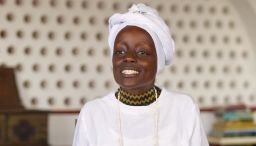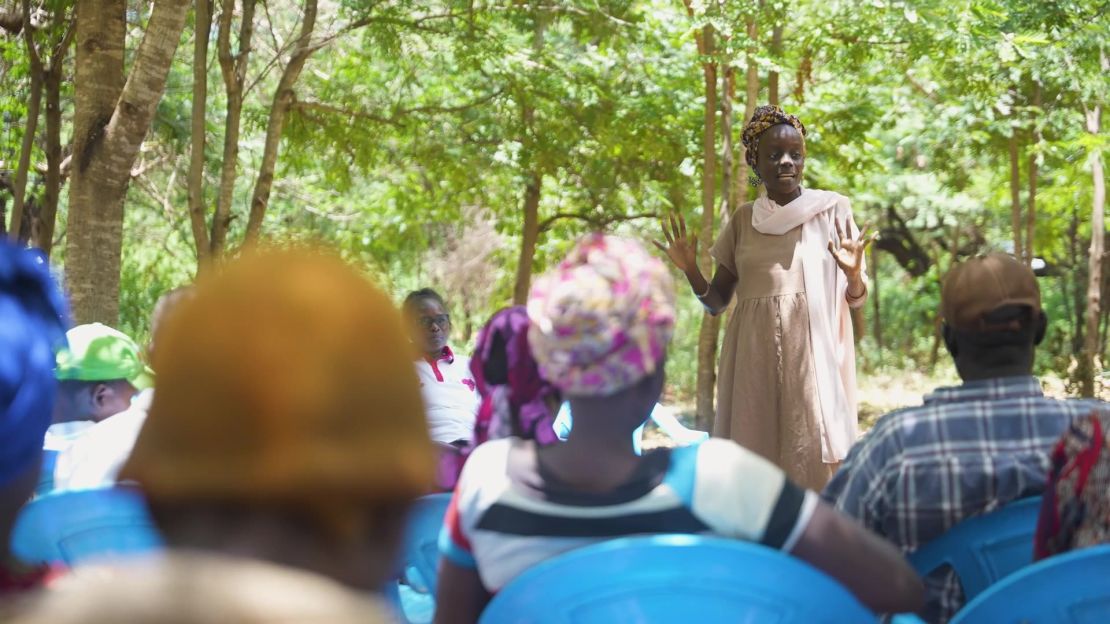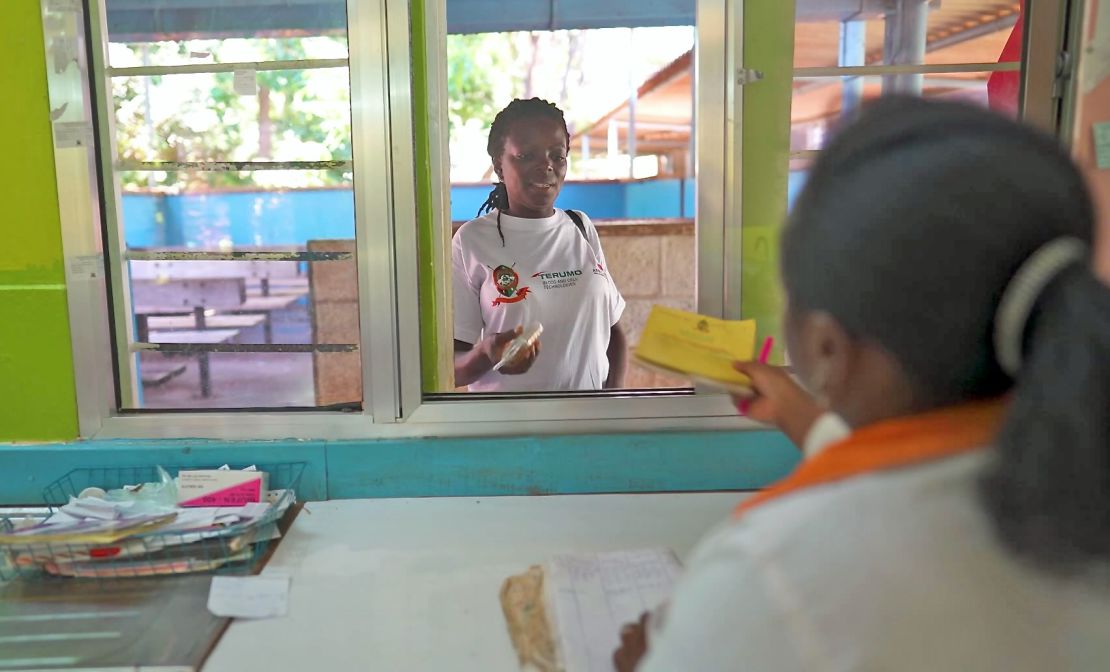CNN
—
Three of the four siblings in Lea Kilenga’s family were born with sickle cell, including Lea. Her oldest sister died of the disease at only 4 years old. Kilenga herself was told that she would not live past her 8th birthday.
Sickle cell disease is an inherited and debilitating blood disorder that causes normal round red blood cells – which carry oxygen throughout the body – to become crescent-shaped and rigid. These malformed cells can block blood flow to vital organs and lead to serious complications, including stroke, blood clots, anemia and severe pain.
“You are often in pain. And they say by the time you’re 40 you have at least one organ that’s badly damaged,” said Kilenga, who grew up in Taveta, Kenya. “(The disease) is something I wouldn’t wish on anyone.”
Of the 120 million people worldwide living with sickle cell disease, more than 66% are in Africa. Despite its prevalence, it is difficult to secure treatment to relieve pain and prevent complications, and stigma against the disease is widespread, even associated with witchcraft in rural areas.
“Sickle cell disease affects more communities with lower resources where accessing medicine and health care is a major financial burden,” Kilenga said.
Kilenga has fought all her life to overcome the challenges of the disease, and she is on a mission to help thousands of other sickle cell patients get the medical care they need to live fulfilling lives. Through her non-profit, the Africa Sickle Cell Organization, she is breaking down stigma and bringing treatments once only available in wealthy Western countries to sub-Saharan Africa.
As a child, Kilenga was ostracized for having sickle cell. She first encountered the stigma surrounding the disease in primary school when other children treated her differently, not wanting to sit next to her or touch her because they thought she was contagious.

“My parents protected us from stressors, educated us and allowed us to grow and thrive,” Kilenga said. “The challenges we faced in the homes of people living with sickle cell was a merry-go-round of pain and hospitals and drugs. That’s how we grew up.”
After finishing university, Kilenga decided to travel around the country taking pictures of people with sickle cell and interviewing them and their families about their struggles with it. Originally, she planned to photograph and interview 10,000 people. But after the horror she encountered on the project, she gave up on the 400.
She found sick children locked in rooms, crying incessantly for help but ignored by family members who had no idea what to do. Kilenga said so many families have no understanding of how to care for their sick children and believe it is better to let them die. The people she met in Kenya had no access to any medical care or pain management. There were 4-year-olds who looked 1-year-old due to poor growth due to lack of treatment.
“When I went to the ground, the reality was worse than I could have imagined,” said Kilenga. “I couldn’t take it anymore because it was just so sad. I decided I had to share this pain with someone who could do something about it.”
Kilenga contacted the director of non-communicable diseases in Kenya’s Ministry of Health.
“I met him. He was a wonderful gentleman. He told me he was inspired by the photographs and the stories and we should schedule a time where we can talk more about it,” Kilenga said.
She waited one month, two months, three months and never heard back. She tried calling his office, sending emails, and got no response. Then she started emailing him a daily portrait and story of someone living with sickle cell from her project.
That got his attention. Eventually, he responded, and together they worked to raise $20,000 to produce a set of national guidelines in Kenya for the management and control of sickle cell disease.
Yet with health services in Kenya decentralized and devolved to provincial governments, to really affect change for people with sickle cell, she was advised by the ministry to start in one region that had the budget to implement sickle cell care.
In 2017, Kilenga moved from Nairobi to a small village in southern Taita-Taveta County. The region is plagued by a lack of access to clean water, food, healthcare and education. There is also an alarmingly high prevalence of sickle cell in the area.
That year Kilenga founded the Africa Sickle Cell Organization and has since helped 500,000 people. It provides access to treatment by offering health insurance, establishing specialized health centers and educating doctors and communities about the disease.

The organization takes patients on board health insurance based on their needs and resources. Then they place them and connect them to the nearest sickle cell facility.
She and her team work in tandem with government, outside agencies and funders to maintain and create clinics that specialize in sickle cell maintenance and treatment. They identify providers who can fill gaps in care and funding to increase access for patients.
“We are talking about inpatient and outpatient care, which means when they are hospitalized, everything is covered,” Kilenga said. “Medical centers, laboratories, medicines and everything else given by health workers are covered by the package.
The organization currently supports four clinics in Kenya serving 2,000 patients, Kilenga said. Patients usually come once a week or twice a month to see doctors, get a diagnosis and monitor blood levels.

After six months of treatment, patients are enrolled in the organization’s program to support their livelihood, such as raising goats and chickens.
“What I’ve come to realize is that you can give people medicine and access to care and you can educate them all you want,” Kilenga said. “But if they don’t have the basics like food, clean water, shelter, you’re not going to realize the success you want for them.”
Opening hearts and minds
Kilenga is also focused on creating community awareness to end the stigma of sickle cell.
“In most societies, when your children have sickle cell, most people blame the woman … and the woman is abandoned and left (to) take care of the children. And society stigmatizes them to the point that they are so poor and destitute that they cannot ask for work, or ask for help, because their families have been shunned,” said Kilenga.
Kilenga travels to villages and talks to village elders, chiefs, parents and community members to educate them about sickle cell.
“This is an interactive session. I think this is one of the biggest tools we use to eliminate stigma and education around sickle cell in communities,” said Kilenga.
“People with sickle cell have been neglected and I think that neglect has made them think they don’t deserve good things.” I need them to know that sickle cell is not just who they are. It’s a fraction of a fraction of their life and they have so much more to do.”
Do you want to participate? Take a look Africa Sickle Cell Organization website and see how to help.
To donate to Africa Sickle Cell Organization via GoFundMe, click here
#told #live #8th #birthday #lifes #mission #fight #patients #deadly #disease #CNN